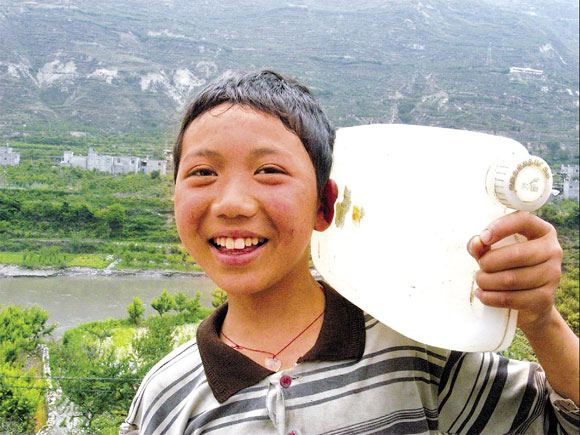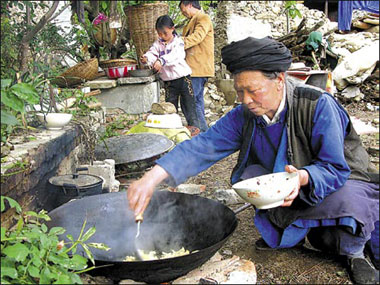Home is where the heart and hope are
By Wang Xu (China Daily)
Updated: 2008-05-29 13:25
Updated: 2008-05-29 13:25
|
Liang Weiqiang, 13, carries water for his family in Keke village of Maoxian county. The quake destroyed the pipes that supplied drinking water to the village. Wang Xu |
MAOXIAN, Sichuan: Before walking into the mountainous Keke village in Maoxian county, I feared I'd see destruction and hear heart-wrenching cries only.
But I was wrong because I came across more smiles than tears and more courage than depression.
On the zigzag road leading to the village, I encountered Liang Weiqiang, a boy carrying water in a jerrycan. But rather than the adroitness with which he manoeuvred the narrow bumpy road, I was impressed by the cheer on his face.
The earthquake destroyed the pipes carrying drinking water to the remote village, forcing the villagers to fetch it from the nearest spring. And that's why 13-year-old Liang and his elder brother have to trudge the mountainous path six times a day.
Though each trip takes them about 20 minutes, Liang seems to like it. "It is okay, I'm not tired," he says.
He turns and runs back. We follow him into one of the worst hit villages by the quake. As we enter, the village reveals the full horror of the quake - not a single house seems to be standing.
Despite the frequent aftershocks some villagers have already started rebuilding houses on the debris of their collapsed homes. The quake, it seems, hasn't been able to destroy their hope.
Keke is about 20 km from the center of Maoxian county, and most of its 900 residents are members of the Qiang ethnic minority. Traditionally, the Qiang have lived in two-story houses made of stone, mortar and wood. The materials used make the buildings extremely vulnerable to quake, and that's the reason why about 90 percent of the buildings in the village were destroyed or damaged.
But since wood is used in great measure, most of the villagers survived when their houses collapsed. In fact, only five died.
One reason why the residents are busy rebuilding their houses is the shortage of tents in the village like elsewhere in the quake-hit region. The local government has been able to distribute just 24 tents among the 200 families. So the others are using plastic sheets to make their temporary shelter.
Pet care
Yu Xujiu, a middle-aged man, is looking for a long and strong piece of wood in the rubble of his home. Just a few steps away is a tarpaulin shelter he has built. Now he wants the piece of wood to use as a pillar and repair his rabbit house.
|
Cao Qingxi, a resident of Keke village, prepares lunch, sitting on the rubble of his collapsed house. Huang Yiming |
Yu was a truck driver, and led a decent life transporting vegetables and fruits from the village. Thanks to its fertile soil, Keke grew a lot of vegetables and fruits and sold them to nearby cities such as Chengdu and Chongqing. The road to Chengdu is now blocked and could take year to reopen.
That means Yu and people like him have to find new ways of making a living. So Yu has now decided to raise rabbits. He already has about 30 baby rabbits, his granddaughter's pets. But he wants to turn the hobby into a business venture, and sell the first warren of 30 rabbits for about 1,000 yuan in two months.
"I'll use the money to repair my truck. And once the road is reopened, I can get back to my old business," he says. "The quake has destroyed everything, but we have to find a way to continue with our life." While Yu is busy with his rabbit house, Liang Jinglun, along with other youths, is trying to clear a ditch at the foot of the mountain.
Landslides have blocked the only ditch that carries irrigation water to the village.
On the May 26, Liang posted a notice in front of the village committee office, asking villagers to help clear the ditch. The next day, almost all the youths in the village showed up. Thirty People's Liberation Army soldiers, too, came to their help.
Liang and Yu both are calm and composed, and instead of the devastation they are keen to talk about the future, their rabbits and the vegetables, for instance.
Standing school
In the past few days, the most crowded place in the village has been its only primary school. But don't get it wrong. There are no parents mourning for their lost children. The school building still stands firm. The old school building, just a 10-minute walk away, has been reduced to rubble, though.
The school, funded partly by a Hong Kong businessman, opened just two months ago, and 42 students and five teachers were present there when the quake struck.
"The school was one of the few buildings in the village that withstood the quake," says 31-year-old Liang Qinggong. "All of us are grateful to Mr Chen, who saved our kids with his donation."
In the small playground in front of the school, villagers are queuing for the relief materials. The authorities have been giving a box of instant noodles, a packet of biscuits and 2.5 kg of rice for each member of a family every five days.
"Food is not a problem the only problem is shortage of tents," says Cao Qingxi. The family of the 38-year-old now lives in a self-built tent but hopes to shift into in a government-funded makeshift house in a month.
Although he knows nothing about construction, Cao says he would go to the spot where the makeshift homes are being built to see if he can help with any work. "After all, it will be our home."
|
||
|
||
|
|
|
|

